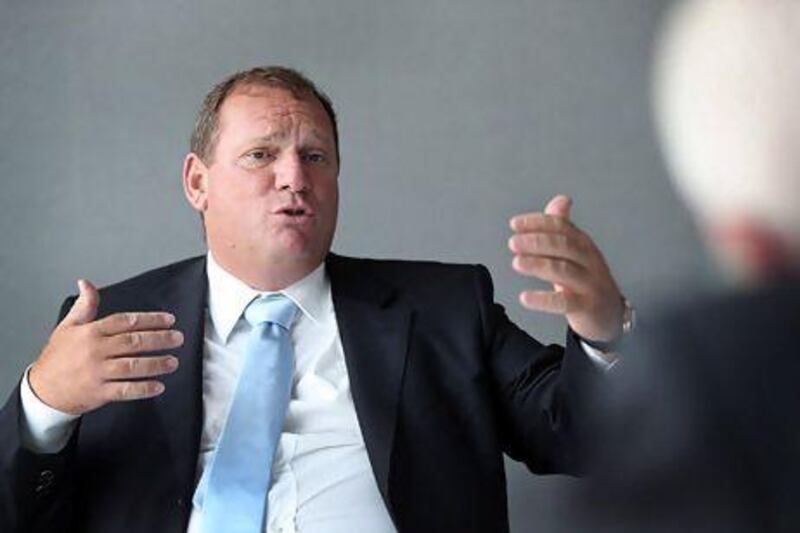The Middle East stands at risk of losing its great natural advantage in energy resources because of flawed policies, to the extent that it could be a net energy importer by 2030.
That was the key message of a recent round-table discussion of regional energy policymakers in Abu Dhabi last week, held under the auspices of Siemens, the German engineering conglomerate that invests a lot of time and capital in solving energy issues.
Michael Suess is the chief executive of the German firm's energy division and he took time after the televised meeting to talk through the challenges of Middle East energy policy.
His conclusion: "Economic efficiency is king."
The problem, as he sees it, is that Middle East energy policy at the moment seems to put a very low premium on efficiency. Expensive oil is increasingly used for domestic electricity generation in some countries, when it should be the capital of future generations.
Gas is liquefied and sent around the world, when it could be piped direct to local consumers. Glitches and technology failures mean that the region's big resource of solar energy has still not been properly exploited.
Meanwhile, some states in the Arabian Gulf region have the highest carbon footprint (a measure of inefficiency of energy usage) in the world. And there seems to be a lack of strategic planning for efficient energy usage at a regional level, he believes.
He mentions the plans for the Fifa World Cup to be held in Qatar in the summer of 2022 as an example of dubious economic efficiency.
Mr Suess sees the need for radical solutions: "It's extremely practical to start all over again with energy policy in this region. It's running on about 30 to 35 per cent efficiency at the moment because lots of the equipment is old and works on the "open cycle" system. Just to replace this with combined cycle equipment would increase efficiency to 55 per cent or more.
"So you've almost doubled output with the same fuel, and what you save you sell at more than US$100 a barrel. That's very practical," he insists.
At the heart of the problem was an issue hotly debated by the round table: the big subsidies provided by governments in the region to their energy-hungry residents.
"People living in the region have a clear understanding that they own the energy resources here, and will only pay more for it if you can show them a clear benefit. Therefore, how to persuade them it makes sense," says Mr Suess.
The lead must come from governments, he recognises, and he thinks there has been a significant change in official attitudes. "My understanding from policymakers is that they are extremely serious about the issue, and that's a different situation from 10 or 15 years ago. Now they care and feel more responsible about energy."
There was little mention made at the round-table talks of one issue that dominates much of the global agenda on energy: nuclear power.
Mr Suess regards it as something of a marginal issue, mainly because it does not meet his criterion of economic efficiency.
"If everything is executed as planned in global energy policy, it will still amount to only 10 to 15 per cent of global supply - pretty much the same as it is today. So you will not ensure the world's energy needs with nuclear. It's not economically feasible.
"Nuclear plants take a long time to build and tie up a lot of capital - US$8 billion on average per station.
All that capital is sitting there tied up, and meanwhile in the life of that plant you might go through three or five stages of the innovation cycle. Private investors cannot invest in nuclear. Only states can do it," he adds.
There are problems, too, with other non-conventional energy sources. Solar, often touted as the Middle East's unique solution to energy problems, is not quite there yet.
"There is lots of sun, that's true, but there are also times when there is cloud, and of course there is night time.
"The problem of electricity storage has not been solved with the current technology. For example, demand for air-conditioning is 24-hours long in the Middle East during the summer, but what do you do at night time?"
In the end, it all boils down to efficiency, or the absence of it. The Gulf region has the highest footprint in the world because "it doesn't use energy sources efficiently, nor the latest technology. It can always be done in a smarter way, that's what our job is at Siemens, to provide the technology to enable that. As long as human beings live here, it will be necessary to use technology to deal with the climate," Mr Suess says.
The Abu Dhabi round table was the final leg of a global tour by Siemens, taking in Europe, North America, China and Russia, which will culminate at the World Energy Congress in Daegu, South Korea, next month.
What message will Mr Suess take to South Korea? "There are many messages, and no one solution. But the main conclusion is that economic efficiency is all-important."
[ fkane@thenational.ae ]





